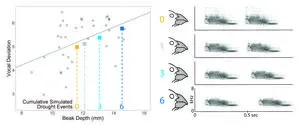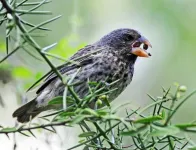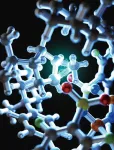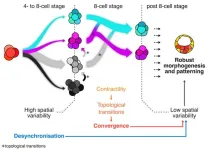(Press-News.org) Fillia Makedon, a Distinguished Professor in the Computer Science and Engineering Department at The University of Texas at Arlington, has been awarded two new National Science Foundation (NSF) grants involving human-computer interaction. In one, she will study extended reality to assess attention levels in people with attention deficit hyperactivity disorders (ADHD); in the other, she will look at how human-robot interaction could help visually impaired persons perform job duties remotely from home using telerobotic technologies.
The NSF awarded Dr. Makedon $440,758 through its Early-Concept Grants for Exploratory Research program, which supports work in its early stages on untested, but potentially transformative research ideas or approaches.
In the first project, Makedon will apply extended reality (XR) technology to assess attention deficit and other cognitive functions, with a goal of creating standardized, yet adaptable, virtual scenarios to provide more accurate and comprehensive cognitive profiles to support traditional assessments. This could be especially helpful for underserved populations and people in remote areas without easy access to professional services.
XR is a combination of real and virtual environments—in this case, virtual reality and mixed reality—which creates an immersive environment that can present a variety of tasks, guided by an avatar, that adapt based on real-time performance data. Results with XR are more accurate than current traditional observation methods, leading to better and reproducible assessments of cognition.
“Extended reality will allow us to record not just how a person responds to questions or tasks verbally, but how they respond physically,” Makedon said. “When their actions are slow or they don’t respond, that’s a good indication that they’ve lost focus. Virtual reality is easy to use, more reproducible and adaptive to situations. Beyond just diagnosing attention deficit disorders, this method could also be used for training to enhance attention.”
For the second project, Makedon is teaming up with Nick Gans, a principal research scientist and head of the Autonomation and Intelligent Systems Division at the UTA Research Institute, and Austin Lighthouse, a warehouse that employs and trains visually impaired and blind people. Together, they will explore the potential for people who are visually impaired to use telerobots to carry out physical tasks remotely. (With the telerobots, the human operator can receive sensor feedback and is in control of navigation and control.)
This would solve one of the barriers to employment for people who are visually impaired or blind: commuting to their workplace. Another work barrier is resistance by employers to hire visually impaired or blind people due to fears of liability if the employee is injured on the job.
Telerobotics could remove these barriers by allowing blind or visually impaired employees to work from home. Makedon and Gans will work with Austin Lighthouse staff to identify specific problems associated with telerobotic training and design an interface that can be used to safely and accurately train employees to use the technology. Their research will also provide an understanding of how visually impaired people perform physical tasks. Outcomes of this study may also impact persons with other types of disabilities who need to work from home.
“It is often difficult for people who are blind or visually impaired to commute to work, so it is important for us to find out if they can be productive from home and keep their jobs through telerobotics,” Makedon said. “Austin Lighthouse is very interested in exploring the use of robots to help their employees be successful. This could also be beneficial for the subjects, because the ability to obtain and keep a job could help ease feelings of isolation and frustration.”
These projects are the latest in a string of research by Makedon focused on improving lives through human-computer and human-robot interactions. She is the director of the Human-Centered Computing Lab and of the Motion Capture Lab at UTA, both of which focus on the use of assistive technologies to enhance human performance and improve quality of life.
These two new grants relate to another ongoing NSF grant from the Disability and Rehabilitation Engineering (DARE) program that focuses on educating people with mobility and spinal issues on how to interact with intelligent robots to achieve daily tasks, such as cooking or preparing to leave the house. For this study, Makedon is working with members of the Movin’ Mavs, UTA’s wheelchair basketball team.
About The University of Texas at Arlington (UTA)
Located in the heart of the Dallas-Fort Worth Metroplex, The University of Texas at Arlington is a comprehensive teaching, research, and public service institution dedicated to the advancement of knowledge through scholarship and creative work. With an enrollment of approximately 41,000 students, UT Arlington is the second-largest institution in the UT System. UTA’s combination of outstanding academics and innovative research contributes to its designation as a Carnegie R-1 “Very High Research Activity” institution, a significant milestone of excellence. The University is designated as a Hispanic Serving-Institution and an Asian American Native American Pacific Islander-Serving Institution by the U.S. Department of Education and has earned the Seal of Excelencia for its commitment to accelerating Latino student success. The University ranks as the No. 1 national public university in the U.S. for veterans (Military Times, 2024), No. 4 in Texas for advancing social mobility (U.S. News & World Report, 2025), and No. 6 in the United States for its undergraduate ethnic diversity (U.S. News & World Report, 2025). UT Arlington’s approximately 270,000 alumni occupy leadership positions at many of the 21 Fortune 500 companies headquartered in North Texas and contribute to the University’s $28.8 billion annual economic impact on Texas.
END
UTA professor earns NSF grants to study human-computer interaction
Grants aim to enhance the lives of the visually impaired and those with ADHD
2024-10-10
ELSE PRESS RELEASES FROM THIS DATE:
How playing songs to Darwin’s finches helped UMass Amherst biologists confirm link between environment and the emergence of new species
2024-10-10
Embargoed: Not for Release Until 2:00 pm U.S. Eastern Time Thursday, 10 October 2024
October 10, 2024
AMHERST, Mass. – They say that hindsight is 20/20, and though the theory of ecological speciation — which holds that new species emerge in response to ecological changes — seems to hold in retrospect, it has been difficult to demonstrate experimentally, until now. In research recently published in Science, biologists from the University of Massachusetts Amherst have identified a key connection between ecology and speciation in Darwin’s finches, famous residents of the Galápagos Islands, Ecuador. Prior work on these birds ...
A holy grail found for catalytic alkane activation
2024-10-10
An organic catalyst offers chemists precise control over a vital step in activating hydrocarbons.
Researchers at Hokkaido University in Japan have made a significant breakthrough in organic chemistry by developing a novel method to activate alkanes, which are compounds that play a crucial role in the chemical industry. The new technique, published in Science, makes it easier to convert these building blocks into valuable compounds, offering advances in the production of medicines and cutting-edge materials.
Alkanes are a primary component of fossil fuels and are also vital building blocks in the production ...
Galápagos finches could be singing a different song after repeated drought—one that leads to speciation
2024-10-10
Galápagos finches use their beaks to crush seeds and sing songs, so what happens to their musical trills when their beaks change to respond to new menus available under drought? Jeffrey Podos and Katie Schroeder found that the song might not remain the same after six cumulative future drought events that would likely reshape the finch beak. The projected changes in male mating songs could be so significant that they provide a pathway for ecological speciation, the researchers suggest. The researchers tested this idea by digitally modifying ...
Hidden “tails” slow marine snow, impacting deep sea carbon transfer and storage
2024-10-10
Newly discovered microscopic mucus tails – trailing from particles of marine snow particles – slow these particles’ descent into the deep ocean, research finds. This doubles the particles’ residence time in the ocean's upper layers and significantly alters estimates of how much carbon is sequestered in the deep sea. The oceans serve as a vast reservoir and critical sink for atmospheric carbon dioxide. A key process driving carbon sequestration in the ocean is the biological pump, where photosynthetic activity ...
Seed dispersal “crisis” may impact plant species’ future in Europe
2024-10-10
Europe is facing a seed dispersal “crisis,” due to extinction threats and population changes among the animals that do the seed dispersing, according to a new synthesis by Sara Beatriz Mendes and colleagues. Their literature review of animal and plant dispersal pairs helped them reconstruct the first European-wide seed dispersal network. Seed dispersal by animals is a critical part of maintaining healthy ecosystems, especially in fragmented environments like those found throughout Europe. Lack of seed dispersal to connect populations could prevent declining plant populations from ...
Nitrogen deposition has shifted European forest plant ranges westward over decades
2024-10-10
Researchers have documented a shift in plant species ranges toward the poles or higher latitudes in the face of climate warming, but Pieter Sanczuk and colleagues now reveal another unexpected pattern of range shift. For decades, understory plants in European temperate forests have been on the move westward, spurred by differences in nitrogen deposition rates. Westward species distribution shifts were 2.6 times more likely than northward ones, according to the researchers, who also noted that forest canopy changes played a role in this shift as well. The findings suggest that factors beyond climate change, such as atmospheric pollution, are also an important part of redistributing biodiversity. ...
Loss of lake ice has wide-ranging environmental and societal consequences
2024-10-10
Pasadena, CA—The world’s freshwater lakes are freezing over for shorter periods of time due to climate change. This shift has major implications for human safety, as well as water quality, biodiversity, and global nutrient cycles, according to a new review from an international team of researchers led by Carnegie Science’s Stephanie Hampton.
Undertaken by scientists based in the United States, Canada, and Sweden, this analysis represents a major call-to-action for wintertime freshwater ecology research. It is published in Science.
The world has millions of freshwater lakes, most of which freeze during the winter. The team’s rigorous review indicates ...
From chaos to structure
2024-10-10
Pipetting liquids into tiny test tubes, analyzing huge datasets, poring over research publications—all these tasks are part of being a scientist. But breaking this routine is essential. Time away from the usual work environment can spark creative ideas. Lab retreats, for instance, offer a great setting where researchers can engage with other peers, often leading to new collaborations.
The latter was true for Bernat Corominas-Murtra and Edouard Hannezo from the Institute of Science and Technology Austria (ISTA). Fascinated by a dataset showcased during a poster session at a collaborative ...
Variability in when and how cells divide promotes healthy development in embryos
2024-10-10
There is variability in when and how cells divide during the development of embryos. While researchers traditionally believed this variability was an obstacle that needed to be regulated, the Hiiragi group now found that it actually promotes healthy development. The results, published in Science on 11 October 2024, encourage other scientists to see the potential of variability and could have significant impact on assisted reproductive technology.
An embryo consists of cells. These cells divide to make new cells, allowing the embryo to grow. The cells experience variability in how and when they divide and in how they interact with each other. Scientists ...
Hidden biological processes can affect how the ocean stores carbon
2024-10-10
New Stanford-led research unveils a hidden factor that could change our understanding of how oceans mitigate climate change. The study, published Oct. 11 in Science, reveals never-before seen mucus “parachutes” produced by microscopic marine organisms that significantly slow their sinking, putting the brakes on a process crucial for removing carbon dioxide from the atmosphere. The surprising discovery implies that previous estimates of the ocean’s carbon sequestration potential may have been overestimated, but also paves the way toward improving climate models and informing ...
LAST 30 PRESS RELEASES:
Why does chronic back pain make everyday sounds feel harsher? Brain imaging study points to a treatable cause
Video messaging effectiveness depends on quality of streaming experience, research shows
Introducing the “bloom” cycle, or why plants are not stupid
The Lancet Oncology: Breast cancer remains the most common cancer among women worldwide, with annual cases expected to reach over 3.5 million by 2050
Improve education and transitional support for autistic people to prevent death by suicide, say experts
GLP-1 drugs like Ozempic could cut risk of major heart complications after heart attack, study finds
Study finds Earth may have twice as many vertebrate species as previously thought
NYU Langone orthopedic surgeons present latest clinical findings and research at AAOS 2026
New journal highlights how artificial intelligence can help solve global environmental crises
Study identifies three diverging global AI pathways shaping the future of technology and governance
Machine learning advances non targeted detection of environmental pollutants
ACP advises all adults 75 or older get a protein subunit RSV vaccine
New study finds earliest evidence of big land predators hunting plant-eaters
Newer groundwater associated with higher risk of Parkinson’s disease
New study identifies growth hormone receptor as possible target to improve lung cancer treatment
Routine helps children adjust to school, but harsh parenting may undo benefits
IEEE honors Pitt’s Fang Peng with medal in power engineering
SwRI and the NPSS Consortium release new version of NPSS® software with improved functionality
Study identifies molecular cause of taste loss after COVID
Accounting for soil saturation enhances atmospheric river flood warnings
The research that got sick veterans treatment
Study finds that on-demand wage access boosts savings and financial engagement for low-wage workers
Antarctica has lost 10 times the size of Greater Los Angeles in ice over 30 years
Scared of spiders? The real horror story is a world without them
New study moves nanomedicine one step closer to better and safer drug delivery
Illinois team tests the costs, benefits of agrivoltaics across the Midwest
Highly stable self-rectifying memristor arrays: Enabling reliable neuromorphic computing via multi-state regulation
Composite superionic electrolytes for pressure-less solid-state batteries achieved by continuously perpendicularly aligned 2D pathways
Exploring why some people may prefer alcohol over other rewards
How expectations about artificial sweeteners may affect their taste
[Press-News.org] UTA professor earns NSF grants to study human-computer interactionGrants aim to enhance the lives of the visually impaired and those with ADHD







